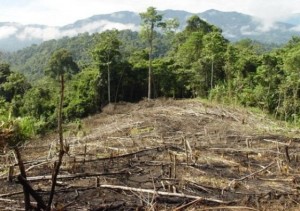Almost a quarter of the world trade in agricultural goods produced on land illegally cleared of forest is destined for the EU; the Netherlands, Italy, Germany, France and the UK dominate these imports

During 2000-12, an average of one football pitch of forest was illegally cleared every two minutes to supply the EU with beef, leather, palm oil and soy used for groceries, animal feed, leather shoes and biofuels, according to a new study released by Fern. It finds that the Netherlands, Italy, Germany, France and the UK are by far the largest consumers of illegally sourced commodities flowing into the EU, which, as a whole, imports 25% of all soy, 18% of all palm oil, 15% of all beef and 31% of all leather in international trade stemming from illegal tropical forest destruction.
“It is well documented that the EU has been leading the world in imports of products which drive deforestation, but this is the first time that we have data showing that much of this deforestation is also illegal,” said Saskia Ozinga, Campaigns Coordinator at Fern, a Brussels-based NGO that published the report.
The study, Stolen Goods: the EU’s complicity in illegal tropical deforestation, builds on research carried out in 2014 to estimate for the first time how much EU consumption is responsible for illegal deforestation – by value and by forest loss. It draws on the extensive and growing body of research documenting illegal deforestation for beef, leather, palm oil and soy – particularly in Brazil and Indonesia.
Due to its large ports, the Netherlands imports most – one-third – of the illegal deforestation commodities that flow into Europe. Many of these goods are, however, passed on to other European countries.
According to the study, the Netherlands, Italy, Germany, France and the UK imported 75% and consumed 63% of the tainted products imported into the EU. Different commodities are more important in different countries:
- The Netherlands and Germany are the largest importers of palm oil, which goes into cosmetics and food products lining grocery stores shelves.
- The UK is a particularly important destination for beef from illegal deforestation.
- Most of the leather crosses over Italy’s borders. The country imported EUR 1 billion in illegal deforestation commodities, making it the largest EU consumer of illegal deforestation goods.
- France is the highest importer of soy, most of which is used to feed chickens and pigs bred for meat.
The research finds that the majority of the illegal agricultural commodities that cross into the EU originate in Brazil and Indonesia. More than half of these products originate in Brazil, where it is estimated that some 90% of deforestation is illegal; a quarter come from Indonesia, where some 80% of deforestation is thought to be illegal. Malaysia and Paraguay are among a number of other important sources.
“EU consumption does more than devastate the environment and contribute to climate change,” said Sam Lawson, author of the report. “The illegal nature of the deforestation means it is also driving corruption, and leading to lost revenues, violence and human rights abuses. Those seeking to halt the illegal deforestation have been threatened, attacked or even killed.”
Action Needed
The report details the actions the EU should take to stop its contribution to illegal deforestation. The key recommendation is for the EU to act on its commitment for an EU Action Plan on Deforestation and Forest Degradation.
“Demand for forest-risk commodities is being driven by a number of different EU policies, such as agriculture, trade and energy policy,” Ozinga explains. “We urgently need an Action Plan to make these different policies coherent, reduce EU consumption and ensure we only import legal and sustainably produced commodities.”
The report suggests that the EU should also use its market strength to push for reforms in supply countries to reduce illegality, just as the EU’s Action Plan to tackle illegal logging has done.
Ozinga continues: “An Action Plan on Deforestation and Forest Degradation could trigger a dialogue between the EU and supply countries using trade as an incentive. The EU can instigate law reform in supply countries by bringing together the relevant governments, industries and civil society groups to not only reduce deforestation but improve governance and strengthen indigenous and local peoples’ tenure rights.”
The report recognises that many companies have recently made voluntary commitments to clean up their supply chains with zero deforestation pledges, but cautions that in a context of widespread illegality, companies will find it hard to meet these commitments without government action.
Hannah Mowat, Fern campaigner, adds that an EU Action Plan would make a vital contribution to tackling climate change. “The role that forests play in regulating the climate is well known. To keep trees standing requires addressing the pressures driving deforestation, so the EU has a vital opportunity to halt deforestation by addressing its trade and consumption in agricultural commodities.”
Fern has disclosed that it will on 30th March, 2015 release a series of reports with recommendations to the EU to halt deforestation and respect communities’ rights, focusing on the EU’s Climate and Energy, Trade, Finance, Sustainable Consumption and Development Cooperation policies. Together, they form a comprehensive action plan for the EU to tackle deforestation and forest degradation.
Fern is a non-governmental organisation (NGO) and a Dutch Stichting created in 1995 to keep track of the European Union’s involvement in forests and coordinate NGO activities at the European level.
